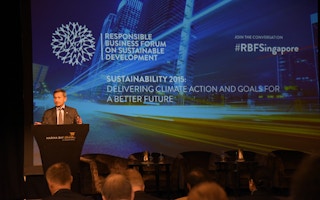Singapore’s Foreign Affairs Minister Vivian Balakrishnan has labelled the recent Indonesian forest fires and resulting haze pollution in the region a “man-made tragedy and a crime”.
Not mincing his words, the Minister said at the opening of the Responsible Business Forum on Sustainable Development held in Singapore on Tuesday: “I know foreign ministers are supposed to be nice, smiley, diplomatic people. But since I used to be the Environment Minister, I can be frank. Brutally frank.”
“The transboundary haze that has afflicted our region for far too long is a man-made tragedy and a crime… It would be bad enough if this was a natural disaster. We would all shake our heads, huddle together, reach out, help one another. But this is not a natural disaster.
“This is a deliberate, man-made tragedy… Vandalism against society, against the environment, and ultimately, against ourselves,” he said.
Illegal forest fires raging in Indonesia’s southern provinces have resulted in a record-breaking haze crisis that has affected millions across Southeast Asia since July. Indonesian media reported 19 deaths from haze-related illnesses and more than half a million locals treated for severe lung infections.
The smoke had enveloped neighbouring Singapore, Malaysia and parts of Thailand and Phillippines, shutting schools and airports in its wake and inflicting damage to local businesses and economies.
The recent fires – a result of illegal land clearing by errant firms to prepare plantations for crops such as timber and palm oil – have destroyed more than 2 million hectares of forest and peatland, almost 30 times the size of Singapore.
Noting that huge quantities of carbon emissions have been released – estimated at around 1.6 billion tonnes – Balakrishnan said it “pains me to have to travel to Paris to negotiate global agreements, whilst right here in our backyard, we are releasing huge amounts of global greenhouse gases.”
He was referring to the United Nations meeting taking place in Paris next month when world leaders are meant to ink a global treaty to tackle climate change.
Hitting out at “a handful of big companies” that are “profiting from this entire exercise” at the expense of the environment and of the rest of society, the minister said the haze crisis was a “classic example of privatising the gain and socialising the pain”.
He added that regional efforts must be intensified to apply legal and commercial pressure on the companies responsible for the illegal land clearing.
Addressing the 500-strong audience at Sands Expo and Convention Centre, Balakrishnan also noted that the crisis has catalyzed a growing movement among consumers to demand responsible and sustainable business practices.
“
The haze crisis is a classic example of privatising the gain and socialising the pain.
Singapore Foreign Affairs Minister Vivian Balakrishnan
The Singapore Environment Council and the Consumers Association of Singapore, for instance, recently led a responsible sourcing campaign among retailers that led some of them to withdraw implicated products from their shelves.
“These may be symbolic, it may not cost the companies a lot of money at this point in time, but I think it sends a very clear signal that enough is enough and that people are going to vote with their wallets and their feet,” said Balakrishnan.
The Singapore government has also taken steps to review its procurement policies to support sustainable businesses, he shared.
“We expect companies to be transparent about your supply chains, particularly those in the oil, palm oil and the forestry sectors, and we hope that others in the private sector will likewise practise sustainable procurement and be prepared to subject themselves to the transparency that is needed.”
Separately, other senior officials speaking at the opening day of the two-day forum spoke about the prospects of a global treaty on climate change in Paris.
Rachmat Witoelar, Indonesia’s president’s special envoy on climate change, said he was optimistic about Paris and that the meeting is “different” from its predecessors.
“The human element has changed… in the past there has been an element of distrust, in particular between developed and developing countries. This has been largely overcome,” he said.
Shyam Saran, former foreign secretary and chief negotiator on climate change for India, said that the bar has “been set low” for Paris and that existing pledges by countries still falls short of keeping global temperatures from rising more than 2 degree Celsius, a level that scientists say will help the world avert dangerous climate change
Saran urged businesses “not to wait for Paris”.
“Businesses face huge risks because of climate change. This is something they must be mindful of. I hope that businesses here in Southeast Asia will take this seriously.”
The fourth Responsible Business Forum on Sustainable Development, supported by Marina Bay Sands, is organised by local events firm Global Initiatives and supported by a wide range of government, private sector and civic society partners, including Eco-Business. The forum’s theme this year is “delivering climate action and goals for a better future”.

















